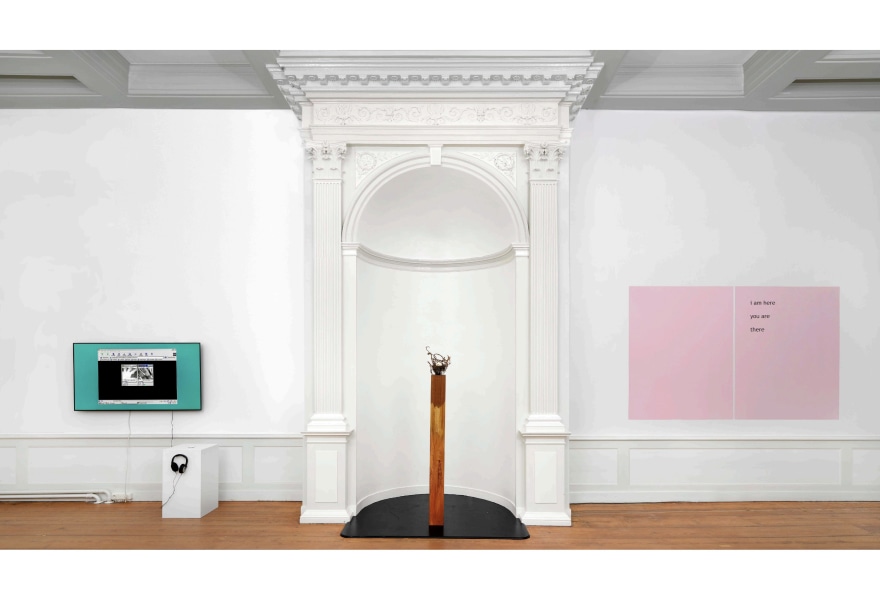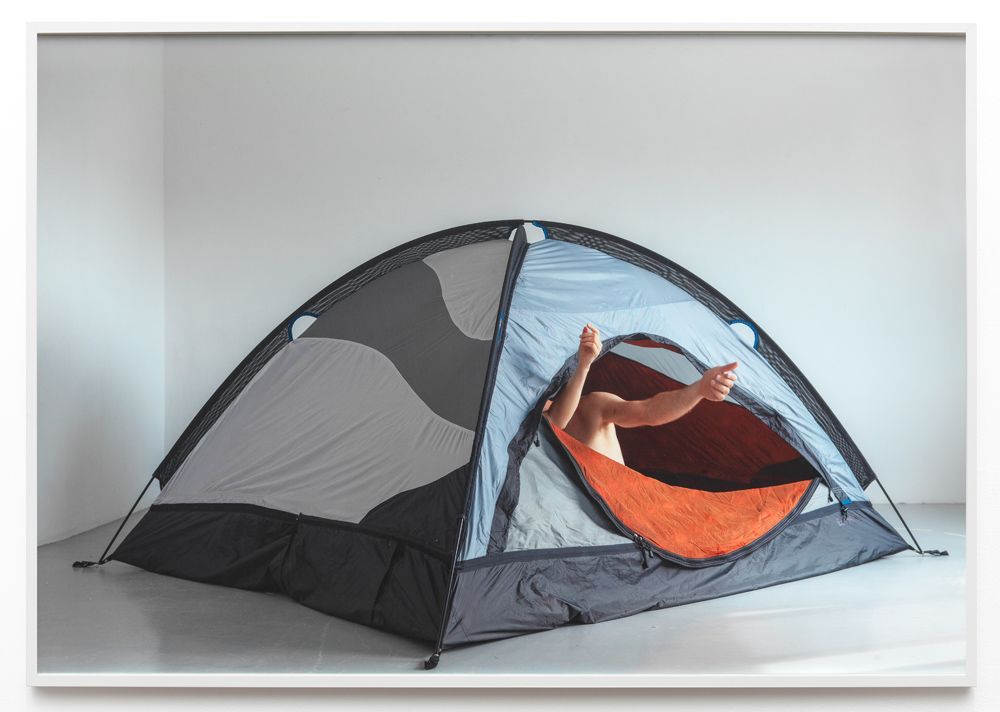Alone Together, Upstream Gallery. Photo: Gert Jan van Rooij.
Until 3 August, Upstream Gallery in Amsterdam presents the group exhibition 'Alone Together', featuring works by Marc Bijl, Marinus Boezem, Alicia Framis, Sarah Friend, David Haines, Entropy8Zuper! (Auriea Harvey & Michaël Samyn), Marijke De Roover, and Rafaël Rozendaal. These pieces, created from the 1970s to the present day, explore how our communication methods have radically changed over this period and how contemporary social relationships are influenced by the online world.
This shift affects how we define and experience intimacy and speaks to the boundary between public and private spheres. The artists in this exhibition offer unique perspectives on topics such as loneliness, desire, and the universal need for connection, while also prompting us to reflect on taboos, entrenched ideas, and the evolving nature of connection in the modern world.
Alicia Framis presents photographic works around "One Night Tent" (2002), an installation for which she transforms everyday clothing into a temporary shelter for spontaneous sexual encounters. Her work challenges social norms and traditional gender roles, exploring themes of intimacy, privilege and diversity and the contrast between public and private spaces. The accompanying instructions add a performative element, actively engaging viewers in the conceptual basis of the work. Framis's tent invites reflection on how intimate moments are experienced depending on their setting.
Alicia Framis, Tent 1, 2019, Upstream Gallery
Marinus Boezem showcases three works that challenge traditional views of art and life using everyday materials. In "Letto d’Amore" ("Bed of Love") (1986), he transforms a white-painted kapok mattress into a sculptural artwork, with diagonal pencil lines and eggs in its hollows evoking associations with both a bird’s nest and a Gothic cathedral. It connects the notion of a bed, as a place of intimacy and love, with the notion of birth. In "Albero" (1984), he places a bird’s nest with a goose egg (a symbol of fertility) on a painted beam, representing the contrast between nature and culture. These more implicit associations refer to the fundamental role of love and intimacy in creating and nurturing new life. Additionally, the exhibition includes Boezem’s iconic invitation "to make love on February 11th, 1978, at 22:00 hours," sent to 350 people worldwide, proposing a collective performance of intimacy. The invitees included many art professionals, but also Princess Beatrix of the Netherlands.

Marinus Boezem, Letto d'Amore, 1986, Upstream Gallery
Auriea Harvey and Michaël Samyn form a romantic couple who collaborate professionally under the name Entropy8Zuper!. Their relationship began as a long-distance one, prompting them to find ways to bridge the gap. They started exchanging interactive web pages for this reason. In their work "Whispering Windows" (1999), they highlight the tension between physical and digital connections, using webcams (with poor resolution and connection) and poetic exchanges to show the essence and complexity of online romance. Their work demonstrates how online intimacy can be as deeply felt, embodied, and full of risk and reward as any other form of intimacy. As a visitor, you become part of an intimate exchange of words. The work is currently also on display at the Museum of the Moving Image in New York.
David Haines's works "Two Boys Kissing" (2015) and "Boy Sleeping" (2017) delve into contemporary themes of digital voyeurism and the representation of intimacy. "Two Boys Kissing" captures a tender moment in graphite, while the video work "Boy Sleeping" immerses the viewer in the world of online chatrooms, exploring the intersection of private and public spheres. This video work shows a boy who has fallen asleep in his chatroom. Watching a sleeping boy, who is unknowingly observed by an anonymous audience, feels much more intimate and invasive than viewing his regular performance, where he has control (agency and consent). Haines’ work investigates what it means to create and view images in our digital image-saturated society.
![]()
David Haines, Boy Sleeping, 2017, Upstream Gallery
Marijke De Roover's works "and just like that…(2)" (2021) and "send in the clowns" (2021) explore the performativity of identity and comment on feminism, queerness and sexuality. Using meme-like images and humorous self-portraits, De Roover challenges traditional notions of relationships, love and success. She invites us to reflect on how we present ourselves and the underlying social norms that guide our behaviour. De Roover examines female and queer sexuality in terms of heteronormativity and the patriarchy, using her body as a political battleground to raise questions about our relative freedoms in the era of digital capitalism.
Rafaël Rozendaal, whose practice continually blurs the boundaries between physical and digital spaces, created a wall painting of a haiku about absence and presence. The work is a minimalist expression of the intersection between digital art and traditional poetic forms. These haikus evolved from notes on his phone to posts and tweets, eventually materialising in the physical world as large-scale murals. Reading the text activates a thought process in the brain, a process the artist likens to computational processes in a computer.
![]()
Marijke De Roover, and just like that...(2), 2021, Upstream Gallery
Marc Bijl's "Love is a Battlefield" series (2020) uses the iconic song by Pat Benatar to explore themes of love and conflict within the context of modern dystopia.
Sarah Friend, who is a technologist and software developer as well as an artist, presents "Untitled (Censored)" (2023). The work examines the boundaries of digital intimacy through AI-generated erotic images based on photos of the artist. These images are then posted online, where they interact with an engaged audience. Friend’s work raises questions about the impact of technology on personal expression and how social networks shape our perception of identity and desire.
![]()
Sarah Friend, Untitled (Censored), 2024, Upstream Gallery
De tentoonstelling ‘Alone Together’ met werk van Marc Bijl, Marinus Boezem, Alicia Framis, Sarah Friend, David Haines, Entropy8Zuper! (Auriea Harvey & Michaël Samyn), Marijke De Roover en Rafaël Rozendaal zal nog tot en met 3 augustus te zien zijn in Upstream Gallery in Amsterdam.
The exhibition ‘Alone Together’, featuring works by Marc Bijl, Marinus Boezem, Alicia Framis, Sarah Friend, David Haines, Entropy8Zuper! (Auriea Harvey & Michaël Samyn), Marijke De Roover, and Rafaël Rozendaal, will be on view at Upstream Gallery in Amsterdam until 3 August 2024.





